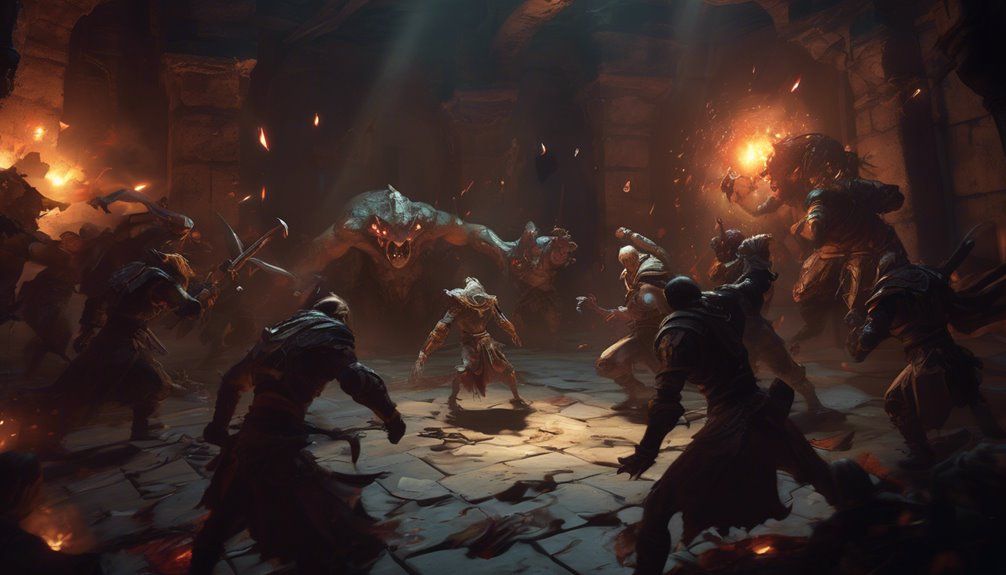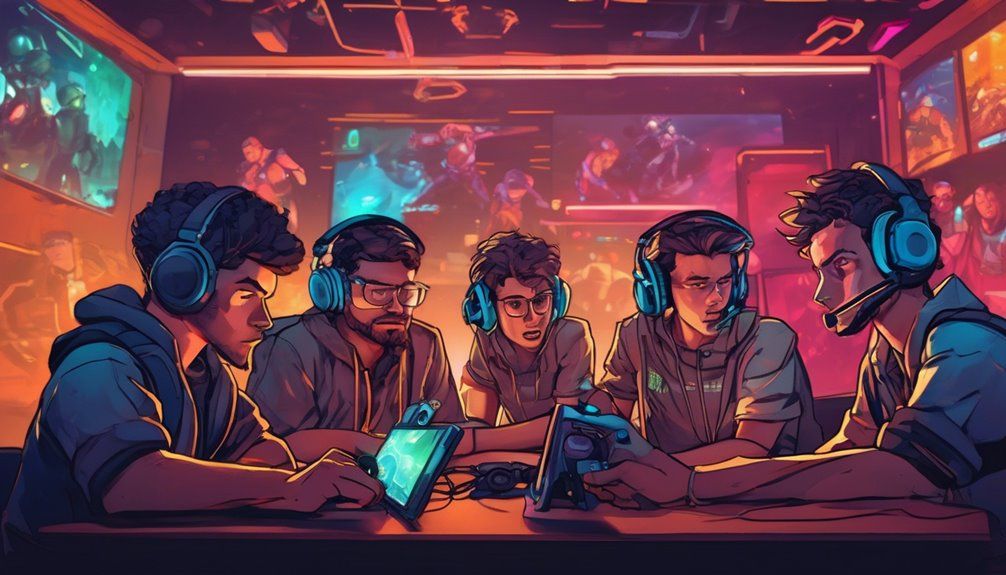Common Raid Carry Mistakes to Avoid
Lack of Communication With the Team
When you dive into a raid, the importance of communication with your team can't be overstated.
Effective communication is the backbone of team cohesion and can make or break your raid experience. Without clear dialogue, misunderstandings can arise, leading to poor performance and frustration among team members.
 Utilizing communication tools like voice chat or in-game messaging can significantly enhance how you interact with your team. These tools allow for real-time updates on strategies, positioning, and cooldowns, which are crucial during intense encounters.
Utilizing communication tools like voice chat or in-game messaging can significantly enhance how you interact with your team. These tools allow for real-time updates on strategies, positioning, and cooldowns, which are crucial during intense encounters.
When everyone’s on the same page, it not only boosts morale but also optimizes your chances of success. Remember, coordination is key; if someone’s out of sync, it can jeopardize the entire raid. Prioritize open lines of communication to ensure each member feels engaged and informed, fostering a more cohesive and effective team environment.
Ignoring Boss Mechanics
Though it might be tempting to focus solely on damage output, ignoring boss mechanics can spell disaster for your raid. Many players underestimate the importance of mechanic awareness, believing that raw numbers will carry the team through. However, boss strategies often rely on precise execution of mechanics that can wipe your group if mishandled.
For instance, failing to dodge an area of effect attack or neglecting to interrupt a critical spell can lead to rapid defeats. Each boss encounter is designed with unique mechanics that challenge players to adapt and respond.
Overlooking Gear and Setup
While it might seem secondary to your performance in a raid, overlooking gear and setup can significantly hinder your team's success. Many players underestimate the importance of gear optimization and often stick with outdated or suboptimal equipment. Before diving into a raid, ensure your gear is not only appropriate for your class but also fully enchanted and gemmed.
Additionally, setup strategies play a crucial role in maximizing your effectiveness. This includes understanding your role in the raid, selecting the right talents, and configuring your keybinds for quick access.
Moreover, don’t forget to review consumables—potions and food buffs can provide essential advantages in challenging encounters. Taking the time to refine your gear and setup can mean the difference between a smooth victory and a frustrating defeat. So, prioritize these aspects to ensure you're contributing positively to your team's overall performance.
Failing to Prepare for Encounters
Failing to adequately prepare for encounters can lead to disastrous outcomes, as understanding mechanics and strategies is crucial for success in any raid. Without a solid grasp of encounter strategies, you risk not only your own performance but also your team's chances of victory. Take the time to study each encounter, noting key mechanics and required positioning.
Utilizing preparation checklists can streamline your preparation process. These lists help ensure you don’t overlook vital aspects, such as cooldown management, healing assignments, and optimal ability rotations. Additionally, gathering insights from experienced players or raid guides can provide you with a tactical advantage.
Not Understanding Role Responsibilities
Understanding the mechanics of encounters is only part of the equation; knowing your role within the team is equally important. Without role clarity and responsibility awareness, you can inadvertently hinder your team's success. Each role has specific tasks that contribute to the overall strategy, and failing to grasp these can lead to chaos.
RoleKey ResponsibilitiesCommon Mistakes
| Tank | Absorb damage, control enemies | Neglecting threat generation |
| Healer | Restore health, remove debuffs | Overcommitting on damage |
| DPS | Deal damage, focus targets | Ignoring mechanics for damage |
When you don’t fully understand your responsibilities, you may find yourself out of position or performing actions that disrupt the flow. Avoid these pitfalls by actively communicating with your team and ensuring everyone’s on the same page regarding their roles.
Neglecting to Learn From Mistakes
When you ignore the lessons from past mistakes, you're missing out on valuable insights that can improve your raid performance. Analyzing trends and embracing constructive criticism can transform your approach, while regularly reviewing past strategies helps you avoid repeating errors. By actively learning from each experience, you not only enhance your skills but also contribute to the overall success of your team.
Analyze Raid Performance Trends
While it's tempting to rush into the next raid without reflecting on past performances, doing so can lead to repeated mistakes that hinder your team's progress. Analyzing raid performance trends allows you to understand what worked and what didn’t. By focusing on key performance metrics, you can leverage data analysis to identify patterns that may be affecting your success. Here are some areas to consider:
- Damage output: Evaluate who dealt the most damage and why.
- Death rates: Look for patterns in player deaths to identify weaknesses.
- Ability usage: Analyze which skills were effective and which weren't.
- Coordination: Assess team synergy and communication during critical moments.
Embrace Constructive Criticism
Embracing constructive criticism is essential for growth in any raid experience, as neglecting to learn from mistakes can stall a team's progress. When you’re open to constructive feedback, you’re not just acknowledging your shortcomings; you’re actively seeking improvement. Accepting criticism from your teammates can lead to better strategies, enhanced teamwork, and ultimately more successful raids.
Instead of taking feedback personally, consider it a tool for development. Analyze the insights shared, and apply them in future encounters. Remember, every player has room to grow, and learning from mistakes is a vital part of that journey. By fostering an environment where constructive criticism is welcomed, you’ll enhance not only your performance but also the overall success of your team.
Review Past Strategies Regularly
Neglecting to review past strategies can significantly hinder a raid team's progress, as it prevents players from recognizing patterns in their failures. To effectively foster strategy evolution, you need to conduct regular assessments of your team's performance. Here are some key points to consider:
- Identify recurring mistakes to avoid repeating them.
- Analyze successful tactics to understand what works.
- Gather feedback from all team members for diverse perspectives.
- Document changes and their impacts for future reference.
Underestimating the Importance of Timing
Though many players focus on strategy and execution, underestimating the importance of timing can lead to costly mistakes during a raid carry. Effective timing strategies are crucial for synchronizing attacks, avoiding enemy mechanics, and maximizing damage output. If you don't pay attention to your raid schedule, you risk missing critical opportunities that can make or break a run.
For instance, coordinating cooldowns with your team can enhance your group’s overall efficiency. If you’re not aware of when to unleash your abilities, you might waste them or, worse, cause a wipe. Understanding timing also involves recognizing when to pull, especially in relation to respawn timers and buffs.
Ultimately, integrating timing into your raid approach isn’t just smart; it’s essential. Stay aware of your surroundings and communicate with your team. By prioritizing timing, you're less likely to fall victim to avoidable errors that could derail your raid experience.
Frequently Asked Questions
How Can I Improve My Communication Skills in Raids?
To improve your communication skills in raids, focus on active listening and provide clear instructions. Engage with your team, ask for feedback, and adapt your style to ensure everyone understands their roles effectively during encounters.
What Tools Can Help Track Boss Mechanics Effectively?
To track boss mechanics effectively, you can use tools like WeakAuras or DBM. They provide customizable alerts and visuals, helping you anticipate mechanics and improve your performance. Utilizing these tracking tools can enhance your overall raid experience.
How Often Should I Update My Gear for Raids?
You should update your gear regularly to ensure optimal upgrades. Focus on gear progression after each raid, assessing drops and vendor options. Staying current enhances your performance, making it easier to tackle tougher challenges ahead.
What Resources Can Help Me Prepare for Specific Encounters?
To prepare for specific encounters, you should utilize strategy guides and encounter simulations. These resources provide insights into mechanics and optimal tactics, helping you refine your approach and improve your performance when facing challenging bosses.
How Do I Analyze My Performance After a Raid?
To analyze your performance after a raid, use self-review techniques like reviewing logs, assessing performance metrics, and seeking feedback from teammates. This helps identify strengths and weaknesses, enhancing your future raids effectively.



